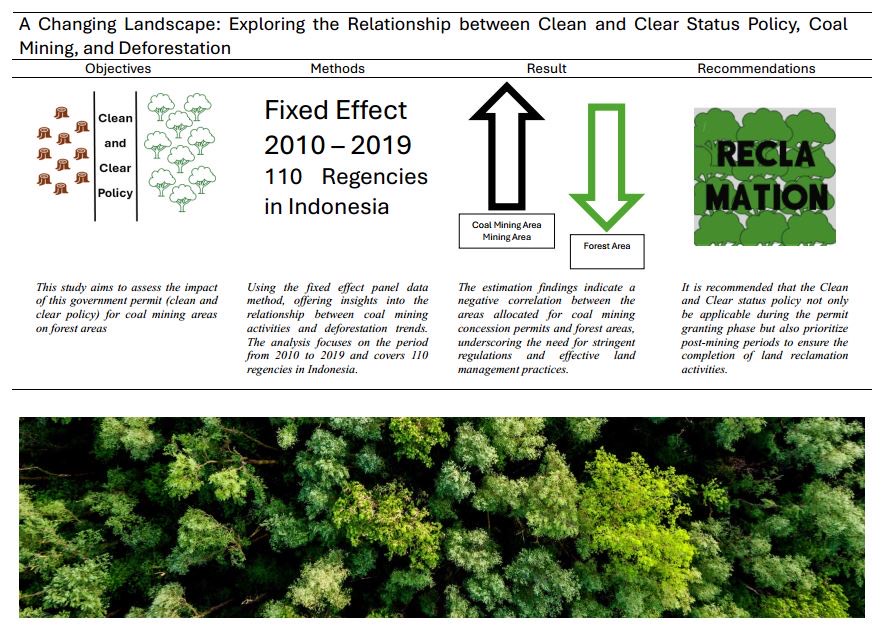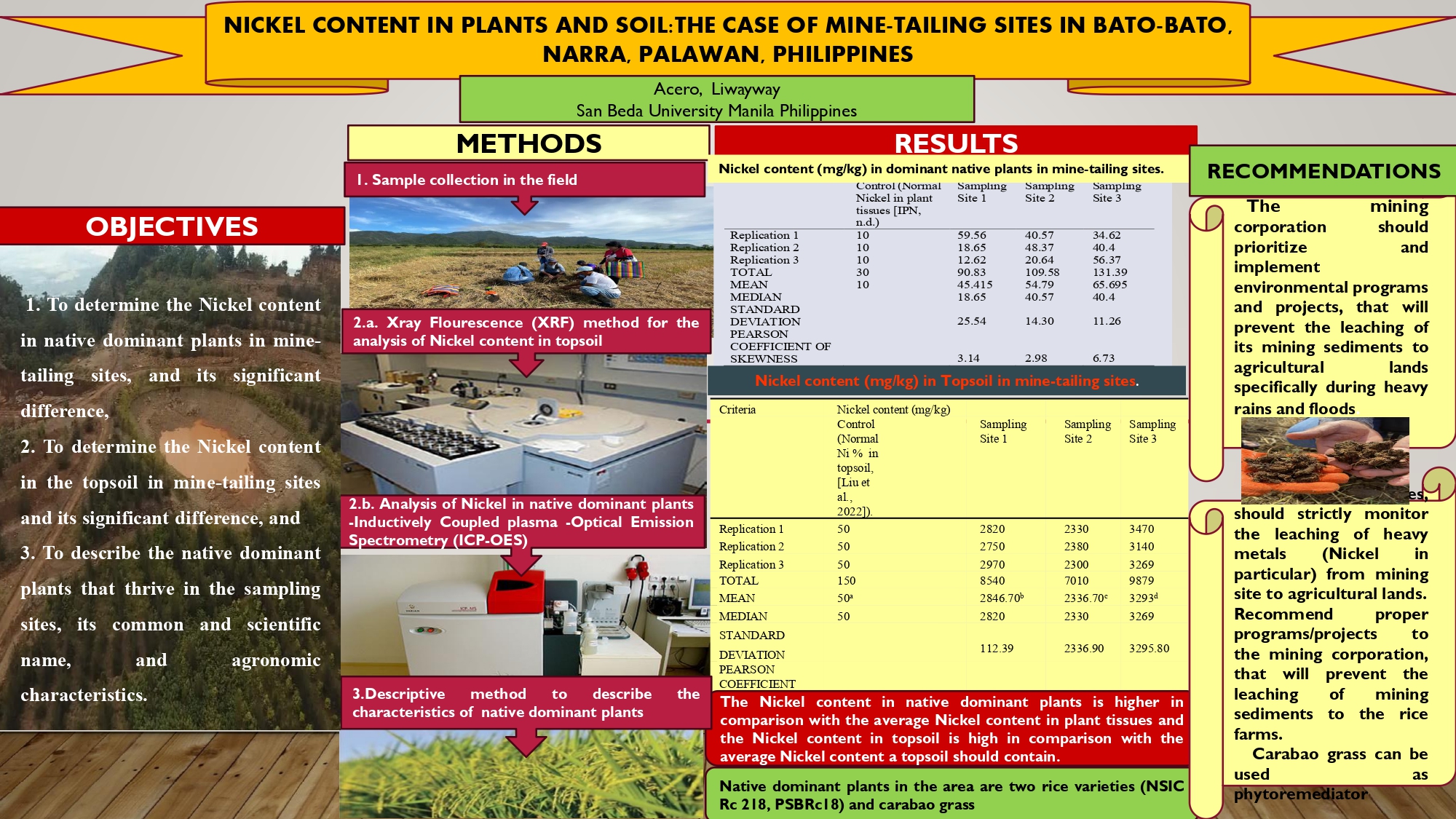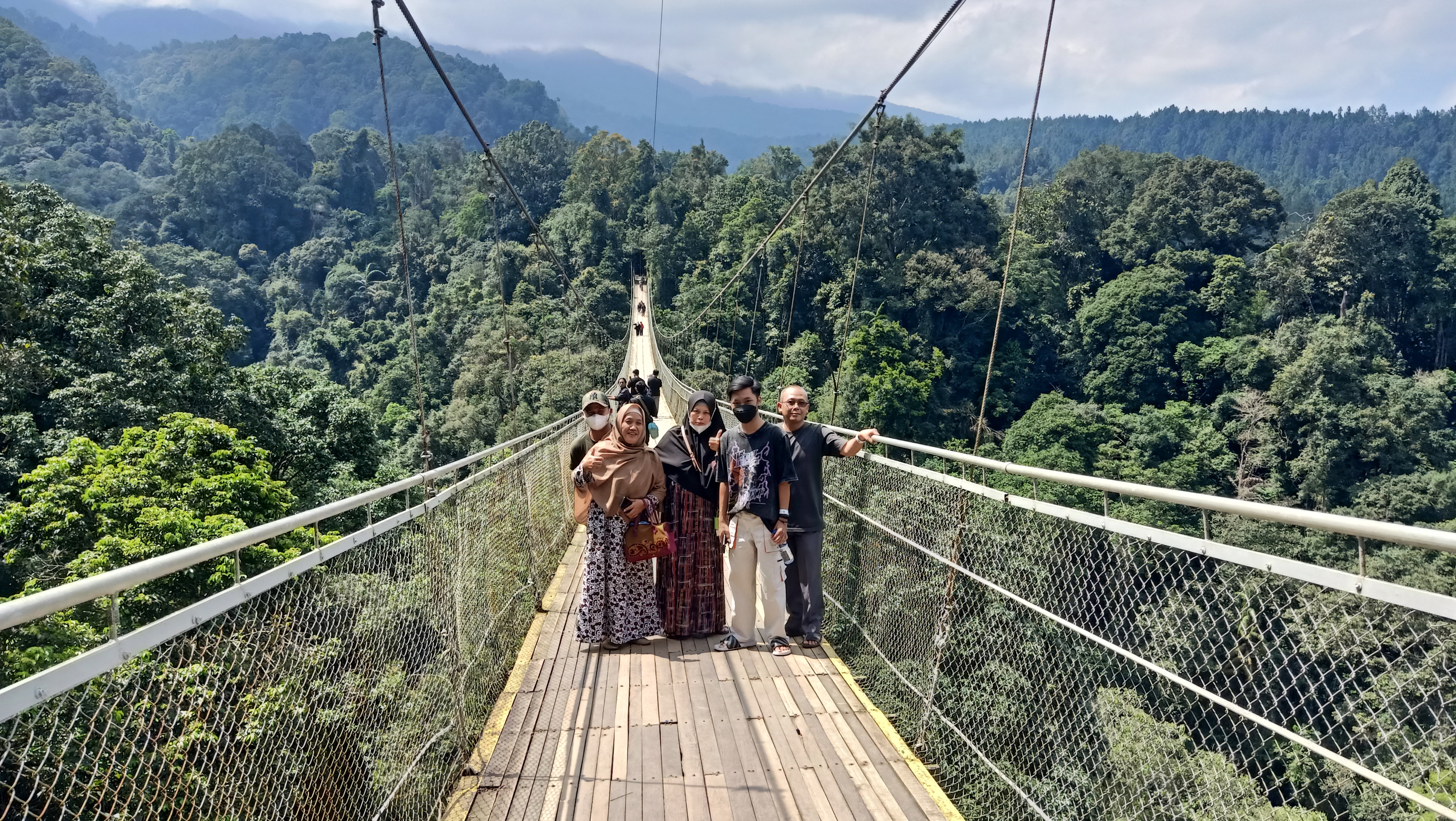Institutional Performance of Mining Reclamation in Forest Areas of East Kalimantan
Abstract
The Indonesian Government accommodates the development of mining sector conducted in forest area based on Forestry Law Number 41/1999 by the scheme of Forest Leasehold License. Reclamation is required to remediate the degraded land caused by mining activity to restore forest structure and function. This study aimed to analyze the implementation of mining reclamation in East Kalimantan forest areas based on its institutional performance. This study is a descriptive qualitative study that implemented the institutional framework of Situation-Structure-Behavior-Performance. From the study, we found that there are 143,804.89 ha of forest area borrowed by 90 units of Forest Leasehold License for coal and mineral mining in East Kalimantan with reclamation progress reached 41.35% over the disturbed areas. Based on institutional performance analysis, it is identified that the challenges in mining reclamation in East Kalimantan forest areas related to regulation, low sanction enforcement, lack of budget, human resource and economic incentives, and the absence of low-cost technology for mining reclamation monitoring and evaluation. Therefore, development of proper regulations is urgently required to improve stakeholder behavior while enhancement of human resource, technology, and law enforcement are also urgent to improve institutional performance of mining reclamation.
Keywords:
References
Ai-bin, Li., Mina, Z., & Ming-yin, L. (2009). Economic analysis and realization mechanism design for full cost of coal mining. Procedia Earth and Planetary Science, 1, 1686−1694. https://doi.org/10.1016/j.proeps.2009 .09.259
Anawar, H. Md. (2015). Sustainable rehabilitation of mining waste and acid mine drainage using geochemistry, mine type, mineralogy, texture, ore extraction and climate knowledge. Journal of Environmental Management, 158, 111−121. https://doi.org/10.1016/j.jenvman.2015.04.045
Article 33. (2014). Research Report 2014: Analysis of lost potency of forest leasehold license for mining.
Azrin, D. (2016). Environmental aspects on coal mining in Indonesia. Forest reclamation in post mining land forum - Japan International Forestry Promotion, 4 February 2016. Jakarta.
Chang-sheng, J., Zhao-xue, C., & Qing-hua, C. (2009). Surface coal mining practice in China. Proceedings of the 6th International Conference on Mining Science & Technology. Procedia Earth and Planetary Science, 1(1), 76−80.
https://doi.org/10.1016/j.proeps.2009.09.014
Creswell, J. W. (2016). Pendekatan metode kualitatif, kuantitatif, dan campuran. Translated from: Research design: Qualitative, quantitative, and mix method approach (4th ed.). Yogyakarta: Pustaka Pelajar
Dariah, A., Abdulrachman, A., & Subardja, D. (2009). Reklamasi lahan eks-penambangan untuk perluasan areal pertanian. Jurnal Sumberdaya Lahan, 4(1).
[DG Mineral and Coal] Directorate General of Mineral and Coal, Ministry of Energy and Mineral Resource. (2015). Annual report 2015.
Doley, D., Audet, P., & Mulligan, D. R. (2012). Examining the Australian context for post-mined land rehabilitation: Reconciling a paradigm for the development of natural and novel ecosystems among post-disturbance landscapes. Agriculture, Ecosystems and Environment, 163, 85−93. https://doi.org/10.1016/j.agee.2012.04.022
Fahruddin, & Abdullah, A. (2013). Dinamika populasi bakteri pada sedimen yang diperlakukan dengan air asam tambang. Jurnal Alam dan Lingkungan, 4(7), 39−44.
Fischer, A., Petersen, L., Feldkötter, C., & Huppert W. 2007. Sustainable governance of natural resources and institutional change-an analytical framework. Public Administration and Development, 27, 123−137. https://doi.org/10.1002/pad.442
Gossum, P. V., Arts, B., & Verheyen, K. (2012). “Smart regulation”: Can policy instrument design solve forest policy aims of expansion and sustainability in Flanders and the Netherlands? Forest Policy and Economics, 16, 23−34. https://doi.org/10.1016/j.forpol.2009.08.010
Gradinaru, G. (2014). A business perspective of a natural capital restoration. Procedia Economics and Finance, 10, 97−103. https://doi.org/10.1016/S2212-5671 (14)00282-2
Gunarto, T., Darusman, D., Sutjahjo, S. H., & Ramdan, H. (2009). Analisis pengembangan kelembagaan asuransi lingkungan. Jurnal Bisnis & Manajemen, 6(1), 13−29.
Hall, D. (1987). Reclamation planning for coal strip-mined lands in Montana. Landscape and Urban Planning, 14, 45−55. https://doi.org/10.1016/0169-2046(87)90005-3
Hirons, M., Hilson, G., Asase, A., & Hodson, M. E. (2013). Mining in a changing climate: what scope for forestry-based legacies? Journal of Cleaner Production, 8, 430−438. https://doi.org/10.1016/j.jclepro.2013.11.025
Kumar, N. P. (2014). Review on sustainable mining practice. International Research Journal of Earth Sciences, 2(10), 26−29.
Lin-lin, C., & Zhen-qi, H. (2009). Economic-theory-based analysis of the collection standard of mine land reclamation bond and its calculation approach. Procedia Earth and Planetary Science, 1, 1275−1279. https://doi.org/10.1016/j.proeps.2009.09.197
Mansur, I. (2017). Mengembalikan produktivitas lahan bekas tambang di Indonesia. Forest Digest Edisi ke-3.
[MoEMR] Ministry of Energy and Mineral Resource. (2018). Handbook of Energy & Economic Statistic of Indonesia. Jakarta: Ministry of Energy and Mineral Resouce.
Muis, H., Jaya, I N. S., Saleh, B., & Murtilaksono, K. 2016. Information required for estimating the indicator of forest reclamation success in ex-coal mining area. Indonesian Journal of Electrical Engineering and Computer Science, 3(1), 182−193.
Nasir, S., Purba, M., & Sihombing, O. (2014). Pengolahan air asam tambang dengan menggunakan membran keramik berbahan tanah liat, tepung jagung dan serbuk besi. Jurnal Teknik Kimia , 3(20), 22−30.
Nopyandri. (2014). Penerapan prinsip Good Environmental Governance dalam rangka perlindungan dan pengelolaan lingkungan hidup. Jurnal Ilmu Hukum, 80−94.
Nugroho, B. (2016). Kelembagaan, karakteristik sumberdaya dan perilaku aktor: Analisis kritis kinerja kebijakan pengelolaan hutan Indonesia. [Orasi ilmiah guru besar IPB.]. Bogor: IPB University.
Ostrom E. (1990). Governing the commons: The evolution of institution for collective actions. New York: Cambridge University Press.
Peck, P., & Sinding, K. (2009). Financial assurance and mine closure: Stakeholder expectations and effects on operating decisions. Resource Policy, 34, 227−233. https://doi.org/10.1016/j/resourpol.2009.03.001
Pohan, C. A. (2014). Cadangan reklamasi pertambangan sebagai loopholes pajak dalam penerapan prinsip taxability-deductibility. Transparansi: Jurnal Ilmiah Ilmu Administrasi, 6(2), 181−198.
Polit, D. F., & Beck, C. T. (2012). Resource manual for nursing research: Generating and assessing evidence for nursing practice. (9th ed.) Philadelphia: Wolters Kluwer Health, Lippincott Williams & Wilkins.
Rosli, A., & Rossi, F. (2014). Explaining the gap between policy aspirations and implementation: The case of university knowledge transfer policy in the United Kingdom. CIMR Research Working Paper Series No. 20.
Saria, L. (2016). Environmental protection of mineral and coal in Indonesia. Paper presented at the Forest Reclamation in Post Mining Land Forum-Japan International Forestry Promotion, 4 February 2016. Jakarta, Indonesia.
Sartika, E. (2014). Analisis isi kualitatif pesan moral dalam film berjudul “Kita versus Korupsi”. Jurnal Ilmu Komunikasi, 2(2), 63−77.
Schmid, A. A. 1987. Property, power and public choice. An inquiry into law and economics (2nd ed.). New York: Praeger.
Statistics Indonesia. (2018). Statistics Indonesia 2018.
Suryanto, & Fernandes, A. (2010). Sosial ekonomi reklamasi batubara. status riset reklamasi bekas tambang batubara. Samarinda: Balai Besar Penelitian Dipterokarpa.
Syaprudin, Bakrie, I., & Kamarubayana, L. (2014). Pinjam pakai kawasan hutan dan realisasi pemanfaatannya oleh PT Mahakam Sumber Jaya di Kabupaten Kutai Kartanegara Provinsi Kalimantan Timur. Jurnal Agrifor, 13(1), 93−104.
Zubayr, M. (2014). Implementasi kebijakan penggunaan kawasan hutan untuk pertambangan: Perspekstif hubungan Principal-Agent Relations [dissertation]. Bogor: IPB University.
Authors

This work is licensed under a Creative Commons Attribution 4.0 International License.
Jurnal Manajemen Hutan Tropika is an open access journal which means that all contents is freely available without charge to the user or his/her institution. Users are allowed to read, download, copy, distribute, print, search, or link to the full texts of the articles in this journal without asking prior permission from the publisher or the author. This is in accordance with the Budapest Open Access Initiative (BOAI) definition of open access.








